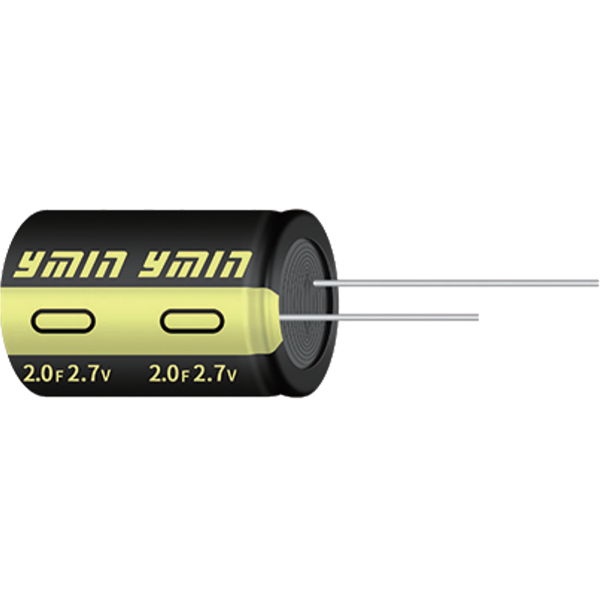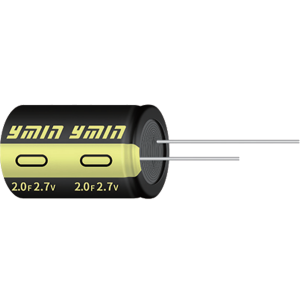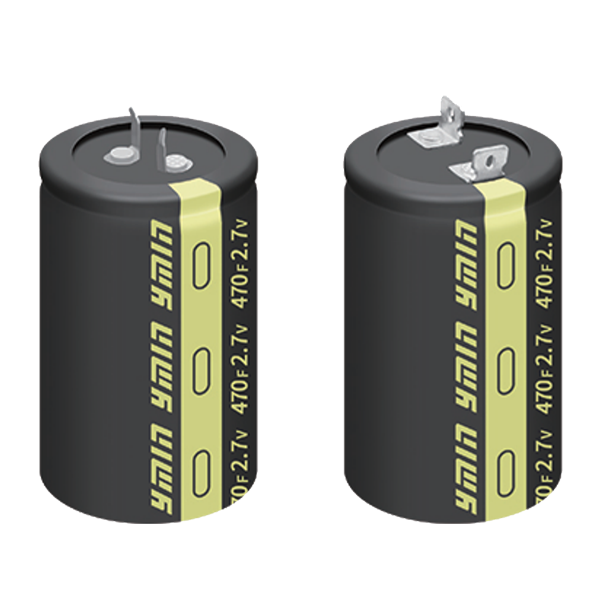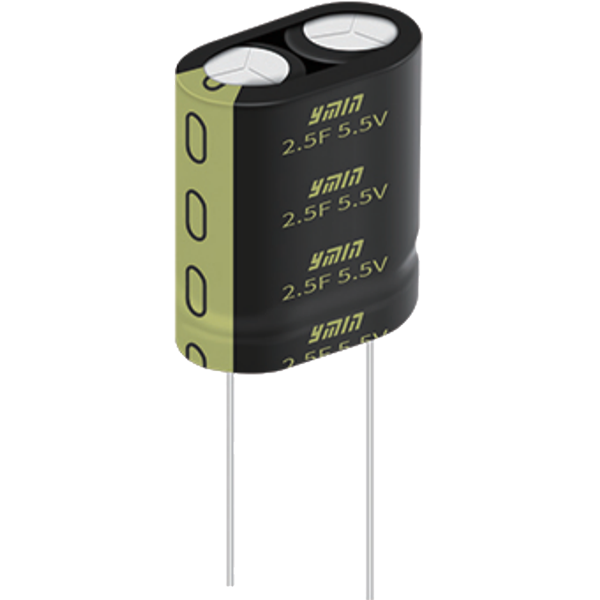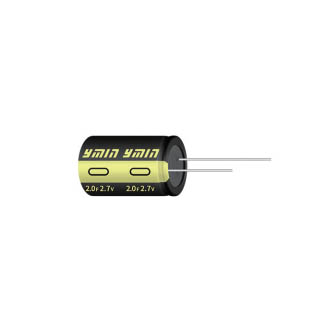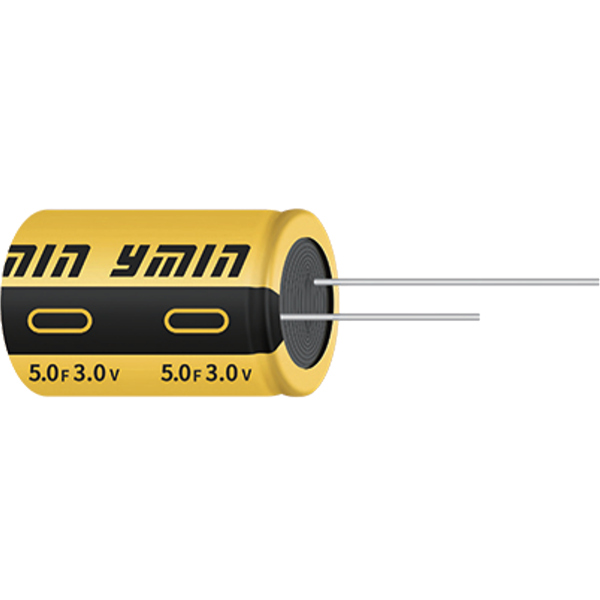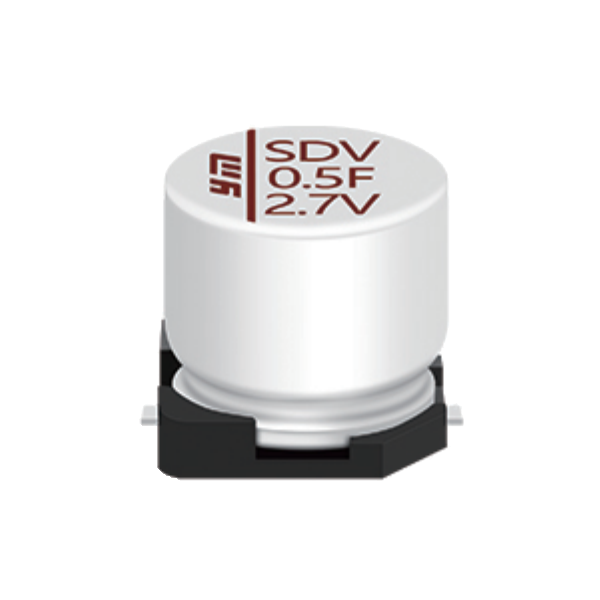Main Technical Parameters
| Item | Characteristic | |
| Operating Temperature Range | -40~+85℃ | |
| Rated Operating Voltage | 2.7V | |
| Nominal Capacity Range | 1.0F~70F | |
| Room Temperature Capacity Deviation | -10%~+30%(25℃) | |
| High-Temperature Load Life | After continuously applying the rated voltage at the rated temperature for 1000 hours, return to 25℃ for testing; | meet the following requirements: capacity change ΔC < 30% of the initial value, internal resistance < 4 times the initial value |
| Steady-State Humid Heat Life | Under 40℃ and 90%~95%RH, continuously apply the rated voltage for 240 hours, then return to 25℃ for testing; | meet the following requirements: capacity change ΔC < 30% of the initial value, internal resistance < 4 times the initial value |
| Self-discharge Characteristics | After constant current charging to the rated voltage, charge at constant voltage for 8 hours, then let stand with the circuit open for 24 hours. | The residual voltage is greater than 80% of the rated voltage. |
| Cycle Life for Charge and Discharge | At 25℃, use constant current to make the capacitor cycle charge and discharge between 3.8V-2.5V for 50,000 times; | meet the following requirements: capacity change ΔC < 30% of the initial value, internal resistance < 4 times the initial value |
| Optimal Storage Environment | -10℃~40℃, below 60%RH | |
| Product Certification | Compliant with AEC-Q200 requirements | |
Product Dimensional Drawing

| L≤6 | a=1.5 |
| L>16 | a=2.0 |
| D | 8 | 10 | 12.5 | 16 | 18 |
| d | 0.6 | 0.6 | 0.6 | 0.8 | 0.8 |
| F | 3.5 | 5 | 5 | 7.5 | 7.5 |
Leading a New Era of Energy Storage: In-Depth Analysis of YMIN SDH Series Electric Double-Layer Supercapacitors
In today's era of pursuing efficient and sustainable energy solutions, a revolutionary device that combines the high energy storage characteristics of batteries with the high power characteristics of traditional capacitors is increasingly becoming the focus of various industries—the electric double-layer supercapacitor (EDLC). As a prominent contributor to this field, YMIN's SDH series 2.7V radial lead type EDLC supercapacitor, with its superior performance, robust reliability, and wide applicability, is redefining the boundaries of energy storage and injecting powerful momentum into countless application scenarios.
The YMIN SDH series EDLC supercapacitor is not an ordinary electronic component; it is a precision energy storage device based on the electric double-layer principle (EDLC). Its core design concept is to achieve the optimal balance between energy density and power density within a minimal physical space.
1. Robust Electrical Performance:
• Wide operating temperature range (-40℃ ~ +85℃): This feature enables the SDH series to confidently cope with extreme environments. Whether in the harsh winters of northern environments, the sweltering summers of southern industrial sites, or the high-temperature conditions inside a car engine compartment, it operates stably, ensuring system reliability under all-weather conditions.
• High Rated Voltage of 2.7V: Compared to traditional 2.5V or 2.3V double-layer supercapacitors, the 2.7V rated voltage means that a single device can store more energy, effectively reducing the number of series connections required in high-voltage applications, simplifying circuit design, and improving overall system efficiency and reliability.
• Tight Tolerances and Stability: The capacitance value is controlled within the range of -10% to +30% at 20℃, and even under drastic temperature changes (-40℃ to +85℃), its capacitance change rate is controlled within ±30%. This stability is crucial for circuits requiring precise timing, energy backup, or power compensation.
2. Exceptional Durability and Long Lifespan:
The lifespan specifications of the SDH series are one of its proudest advantages.
• 85℃ High-Temperature Durability Test: After being continuously subjected to a rated voltage of 2.7V for 1000 hours at an environment as high as 85℃, its capacitance change rate remains within ±30% of the initial value, and the equivalent series resistance (ESR) increase does not exceed four times the initial standard. This demonstrates its superior resistance to degradation under continuous high-load operation.
• Long Cycle Life: The electric double-layer supercapacitor can withstand hundreds of thousands or even millions of charge-discharge cycles, far exceeding any chemical battery. This means that throughout the entire lifespan of the device, there is virtually no need to worry about replacing energy storage components due to aging, greatly reducing maintenance costs and failure rates.
3. Excellent Physical and Environmental Adaptability:
• Robust Structure: The radial lead type package facilitates PCB board soldering, and the robust structure can resist certain mechanical vibrations and shocks.
• Excellent Moisture Resistance: In a harsh environment with a temperature of 25℃ and relative humidity of 90%, after 500 hours of continuous operation, performance degradation remains within a controllable range, demonstrating its strong resistance to humid environments.
• Environmental Compliance: Products fully comply with RoHS and REACH directives, demonstrating YMIN's social responsibility for environmental protection and human health.
A diverse range of models (such as SDH2R7L1050812, SDH2R7L7061850, etc.) with diameters from 8mm to 18mm and capacitance values from 1F to 70F provide engineers with flexible choices to meet different space and performance requirements.
Compared to traditional lead-acid and lithium-ion batteries, the advantages of the SDH series double-layer supercapacitors are particularly evident:
• Instantaneous High-Power Output: Lithium-ion batteries generate significant internal losses when releasing large currents instantaneously, leading to overheating, shortened lifespan, and even safety hazards. SDH double-layer supercapacitors, with their extremely low ESR (down to 20mΩ), can easily handle instantaneous high-power demands, such as motor starting and equipment acceleration, with extremely high efficiency.
• Ultra-Fast Charging and Discharging: Charging time can be reduced from hours (for batteries) to seconds or minutes. This is a revolutionary change for applications requiring frequent and rapid energy replenishment. • Ultra-wide operating temperature range: Lithium batteries experience a sharp decline in performance at low temperatures, sometimes even becoming unusable, while the SDH series maintains excellent performance even in extremely cold environments down to -40°C.
• Truly maintenance-free: Its virtually unlimited cycle life makes it a "one-and-done" energy storage solution, especially suitable for devices that are difficult to access after installation or have extremely high maintenance costs.
The YMIN SDH series double-layer supercapacitors have extremely wide applications, quietly improving every aspect of our lives.
1. Smart Meters and the Internet of Things (IoT): In smart water meters, gas meters, and electricity meters, SDH double-layer supercapacitors serve as backup power sources. During main battery failure or replacement, they provide the energy needed for a final data upload to communication modules (such as LoRa and NB-IoT), ensuring that critical metering data is not lost. Their long lifespan perfectly matches the over ten-year lifespan of the meters, avoiding frequent maintenance due to battery depletion.
2. Automotive Electronics and New Energy Vehicles:
• Regenerative Braking: In new energy vehicles, double-layer supercapacitors can efficiently capture the instantaneous high-power energy generated during braking and quickly release it for acceleration, improving energy efficiency.
• Starter Assist: In hybrid vehicles or large diesel vehicles, double-layer supercapacitors can be connected in parallel with the starter battery to provide peak power during cold starts, reducing the burden on the main battery and improving the start-up success rate, especially performing excellently in low-temperature environments.
• Onboard Electronic Systems: Provides instantaneous power outage protection for advanced driver assistance systems (ADAS), entertainment systems, etc., preventing system restarts or data loss due to voltage drops.
3. Industrial Automation and Energy Management:
• Peak Power Compensation: In factory automation equipment, when multiple servo motors start or brake simultaneously, it can cause a huge impact on the power grid. SDH double-layer supercapacitors can act as a "power pool," releasing energy when needed to smooth the grid load and protect sensitive equipment.
• Uninterruptible Power Supply (UPS): In data centers or industrial control systems, UPS supplements large UPS systems, providing critical support during the brief "window" when main power is interrupted and backup generators have not yet started, ensuring zero-second switching and uninterrupted operation.
• Smart Grid: Used for transient stability control of the power grid, rapidly compensating for reactive power and improving grid quality.
4. Consumer Electronics and Security Equipment:
• Emergency Lighting and Flashlights: Enables fast charging and instantaneous high-brightness flashing in digital cameras and flashlights. Provides reliable illumination for extended periods after power outages in fire emergency lights and safety exit signs.
• Video Doorbells and Surveillance Cameras: In wireless video doorbells, double-layer supercapacitors can quickly charge, supporting long video calls or recordings, solving the pain points of slow charging and short standby time in battery-powered devices.
5. Military and Aerospace: In these fields with extremely high reliability requirements, the SDH series' ultra-wide temperature range, long lifespan, and high reliability make it an ideal backup or auxiliary power source for critical equipment such as airborne equipment, communication systems, and missile guidance systems.
With the rapid development of technologies such as 5G, the Internet of Things, new energy vehicles, and artificial intelligence, the demand for efficient energy storage will explode. YMIN, with its deep technological accumulation and rigorous quality control, has laid a solid technological foundation for this future vision through its SDH series products. Choosing YMIN is not only choosing a high-quality product, but also choosing a reliable partner committed to driving energy transformation and creating a green and intelligent world. Whether experienced engineers are conducting forward-looking designs or enterprises are seeking product upgrades, YMIN's SDH series double-layer supercapacitors are a trustworthy and intelligent choice.
| Series | Rated Voltage (V) | Capacitance (F) | Product Dimensions ΦD×L (mm) | ESR (mΩ/20℃, 1kHz) | Leakage Current at 72h (μA) | Continuous Current (A) | Peak Current (A) | Stored Energy (J) | Product Number |
| SDH | 2.7 | 1 | 8×11.5 | 160 | 4 | 0.26 | 1.09 | 3.6 | SDH2R7L1050812 |
| 2.7 | 2 | 8×13 | 120 | 5 | 0.5 | 1.99 | 7.3 | SDH2R7L2050813 | |
| 2.7 | 3.3 | 8×20 | 80 | 8 | 0.83 | 3.19 | 12 | SDH2R7L3350820 | |
| 2.7 | 3.3 | 10×13 | 70 | 8 | 0.83 | 3.31 | 12 | SDH2R7L3351013 | |
| 2.7 | 5 | 10×20 | 60 | 15 | 1.24 | 4.66 | 18.2 | SDH2R7L5051020 | |
| 2.7 | 7 | 10×20 | 50 | 20 | 1.71 | 6.2 | 25.5 | SDH2R7L7051020 | |
| 2.7 | 10 | 10×25 | 40 | 30 | 2.41 | 8.44 | 36.5 | SDH2R7L1061025 | |
| 2.7 | 10 | 12.5×20 | 35 | 30 | 2.44 | 8.85 | 36.5 | SDH2R7L1061320 | |
| 2.7 | 15 | 12.5×25 | 30 | 40 | 3.57 | 12.09 | 54.7 | SDH2R7L1561325 | |
| 2.7 | 20 | 12.5×30 | 28 | 50 | 4.62 | 14.67 | 72.9 | SDH2R7L2061330 | |
| 2.7 | 25 | 16×25 | 25 | 60 | 5.68 | 17.42 | 91.1 | SDH2R7L2561625 | |
| 2.7 | 30 | 16×30 | 24 | 70 | 6.66 | 19.47 | 109.4 | SDH2R7L3061630 | |
| 2.7 | 35 | 16×35 | 22 | 80 | 7.68 | 21.93 | 127.6 | SDH2R7L3561635 | |
| 2.7 | 40 | 18×40 | 20 | 90 | 8.71 | 24.55 | 145.8 | SDH2R7L4061840 | |
| 2.7 | 50 | 18×40 | 18 | 110 | 10.63 | 28.72 | 182.3 | SDH2R7L5061840 | |
| 2.7 | 60 | 18×40 | 16 | 130 | 12.58 | 33.2 | 218.7 | SDH2R7L6061840 | |
| 2.7 | 70 | 18.0×50 | 15 | 150 | 14.37 | 36.7 | 255.2 | SDH2R7L7061850 |
